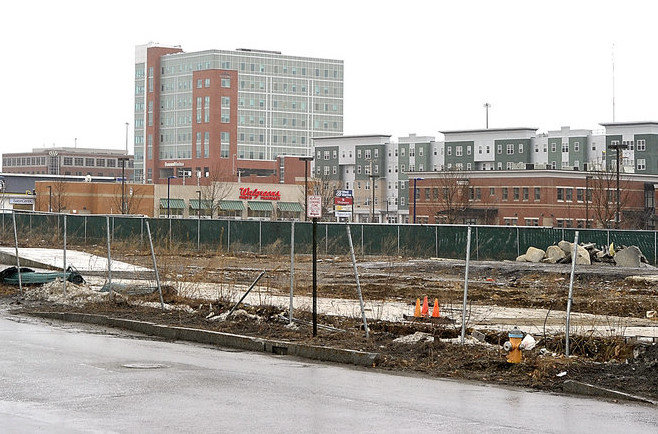PORTLAND — A small group of Greater Portland residents is spending thousands of dollars trying to persuade the City Council to reject a zoning change that would allow as many as four, 14-story towers in Bayside.
Timothy Paradis of Portland and more than a half-dozen other people bought an advertisement in Wednesday’s Portland Press Herald opposing a developer’s request to build a 165-foot-tall building on a site where the height limit is now 105 feet.
“I don’t think it’s too late to renegotiate,” Paradis said Tuesday. “We may be standing at the altar, but it’s better to renegotiate the terms of a marriage rather than going through with a bad marriage.”
Councilors are expected to vote Monday on a request to increase the height limit, and on changes to building design standards. The increased height limits and other changes have been endorsed by the city’s Planning Board.
The half-page ad cost more than $3,000, according to Paradis and an advertising executive with the newspaper, and was financed mostly by Paradis, 56, a consultant for nonprofit groups who has lived in Portland for 15 years.
The ad includes contact information for each city councilor and urges residents to “let them know what you think.”
The ad is “unfortunate,” said Greg Shinberg, the local consultant who is handling the “midtown” project for Federated Cos. The Miami-based developer has 3.25 acres of city-owned land on Somerset Street under contract to buy for $2.3 million — if it gets the approvals it needs for the project.
“The changes we’re asking for are very minor in the big picture,” Shinberg said. “This project is the key element in the transformation of Bayside. It should go forward.”
City and neighborhood officials have made a priority of redeveloping Bayside, a former industrial neighborhood next to Interstate 295 that has been home to rail yards, scrap yards and warehouses.
Midtown calls for three phases that could take as long as 10 years to complete. It envisions 675 market-rate apartments in four 165-foot-tall towers, 1,100 parking spaces in two garages and 1,100 square feet of retail space.
The first phase is projected to cost about $38 million. It would consist of 180 to 190 market-rate apartments, a six-level parking garage for 705 vehicles and 39,000 square feet of ground-floor retail space.
Most of the city-owned land is zoned to allow buildings as tall as 125 feet. In certain areas, buildings can be 165 feet tall if they meet certain conditions, including having at least 20 housing units.
Midtown’s first tower is planned on a parcel with a 105-foot height limit, so it needs a zoning change.
The half-page newspaper ad, “Bad Plan for Portland,” says the “Dismal Reality” of the proposed development does not fulfill the “Original Promise” of a neighborhood-wide planning process for Bayside.
The ad says the development would create a “superblock” on Somerset Street and a “dead zone” for pedestrians, while casting shadows and funneling wind.
The “superblock,” along with parking for so many vehicles, would only increase reliance on vehicles, said Paradis, who argues that automobile ownership is on the decline in the U.S.
Paradis and the small group behind the ad aren’t the only opponents of the project. The Bayside Neighborhood Association Board of Directors, the Portland Society for Architects, and residents of the Chestnut Street Lofts, where views of Back Cove would be blocked by the towers in Bayside, also have expressed opposition to elements of the proposal.
Opposition to midtown stems largely from its departure from a neighborhood plan, “A New Vision for Bayside,” which was adopted in 2000. The plan was the product of two years of work involving hundreds of participants and dozens of public meetings. It produced the current height limits, which were established in 2006, to prevent larger buildings from overshadowing smaller ones.
Paradis said the group supports development in Bayside on a more “human scale,” in keeping with the city’s historic architecture and walkable neighborhoods.
“This development is selling Portland very short,” Paradis said. “I feel Portland has something very special that should be protected.”
Shinberg said the extra height and other changes are needed to make midtown financially viable. The project site is contaminated from previous industrial uses, the lots are relatively narrow and the soils are poor, so pilings must be driven, he said.
Shinberg said it is “somewhat disingenuous” for people to claim they support the project while opposing the height-limit increase. He said he suspects that most of the opposition is about the loss of views, which developers have worked hard to preserve.
“They’re trying to have it both ways,” he said.
Randy Billings can be contacted at 791-6346 or at:
rbillings@pressherald.com
Twitter: @randybillings
Send questions/comments to the editors.



